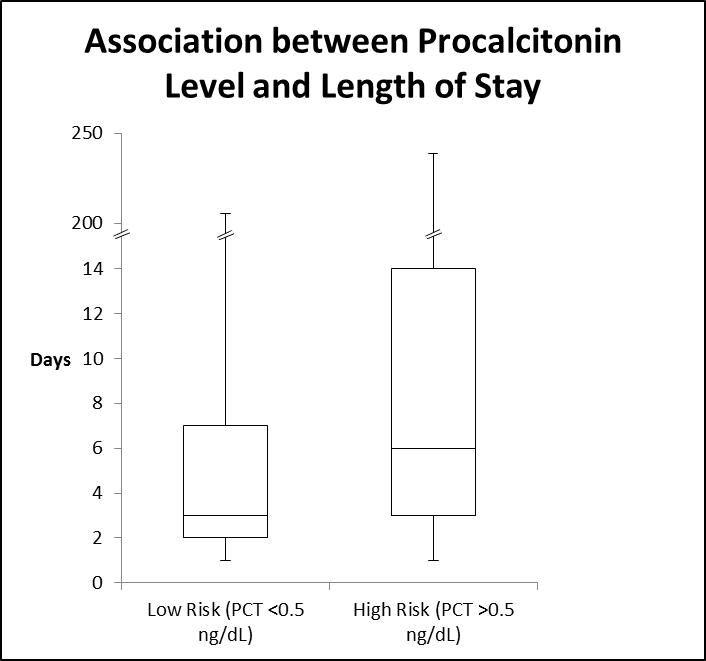Background: Procalcitonin (PCT) is a precursor peptide to calcitonin produced by the thyroid parafollicular cells, and the intestinal and lung neuroendocrine cells. PCT is a proinflammatoy marker specific to bacterial infections, and was initially used clinically to guide antibiotic therapy in lower respiratory tract infections. PCT has seen its role expanded to aid with initiation, escalation and de-escalation of antibiotic therapy in sepsis and critically ill patients being guided by serial PCT levels. The objective of this study is to evaluate the association between PCT level and hospital related outcomes including length of stay, mortality and 30 days readmission using a retrospective case-series.
Methods: We reviewed 686 patients admitted to a single medium-sized tertiary care hospital with suspected bacterial infection and had a serum PCT level drawn from January 1, 2017 to April 30, 2017. All patients with serum PCT levels were included regardless of diagnosis, type of suspected infection, or comorbidities. For patients with PCT testing on more than one occasion, the highest level recorded was used. Patients were stratified according to risk of severe sepsis and septic shock with procalcitonin level based on our hospital lab machine value. Low risk is defined as PCT < 0.50 ng/mL and high risk > 0.50 ng/mL. The association between PCT and length of stay were analyzed via Wilcoxon Signed-Rank Test and between PCT and 30-day readmission rate via Pearson’s Chi-Squared Test using JMP statistical software by the authors.
Results: The mean patient age was 65.63 years; 50.29% were female and 49.71% male. The median length of stay was 3 days longer (p < 0.0001) in the high risk group, 6 days (IQR 3-14 days), compared to the low risk group, 3 days (IQR 2-7 days). The 30-day readmission rate was 5.17 % higher (p = 0.075) in the high risk group, 18.01% (95 CI 12.78-23.23), compared to the low risk group, 12.84% (95% CI 9.82-15.86). There were no in-hospital deaths.
Conclusions: This study suggests that risk-stratification with procalcitonin level in hospitalized patients with suspected bacterial infections is an independent predictor of length of stay and may also be associated with increased risk of 30-day hospital readmissions.

